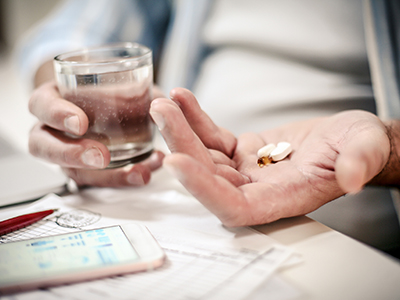
Repurposing a mobile app could help patients stay on top of their medications and protect the health of their new kidneys.
As a kidney transplant pharmacist, Cindy Luo ensures that kidney transplant patients take the correct medication and dose after surgery. Yet, despite pharmacists’ and clinicians’ best efforts, many transplant patients do not take their medications as prescribed, and go on to develop health problems that can put their new organ and overall health in jeopardy.
“Globally, medication non-adherence has been identified as a major contributor to the loss of kidney function after a successful transplant surgery.”
Clinicians have managed to reduce short-term—one- to three-year—kidney transplant rejection rates using new medications, says Luo, who works at the Vancouver General Hospital Kidney Transplant Clinic. However, they have yet to achieve significant reductions in long-term outcomes because of such things as medication non-adherence.
To address this, Luo enlisted the help of mobile phone technology—something that continues to gain traction in health care settings—for a new research study. She and colleagues have repurposed the Medisafe app for Android and Apple OS to remind transplant patients when to take essential medications in order to keep their new kidneys healthy.
“We know that if patients adhere to medications as prescribed, they will be more likely to retain the health of their kidney transplant for longer.”
Luo’s study involves approximately 65 patients, all 18 years of age or older, who were recruited from the Kidney Transplant Clinic. Study participants will have just received a kidney transplant and are asked to use the app, under the direction and oversight of the study team, for one year.
“Right now, all kidney transplant patients receive a printed medication calendar, but their medications and doses can change at the drop of a hat between clinic visits,” remarks Luo. “The app reminds patients when to take their medications and the proper dosages, and lives in a piece of technology patients are most likely to have with them at all times.”

To help participants keep on top of their medications, the app has a programmable alarm for important reminders. It displays the color and shape of pills, making it easier for patients to recognize. It also lets participants know how many pills they have remaining and when it is time to get a refill.
Throughout the study, Luo and colleagues will be checking in with participants to get feedback about the app and whether participants find it useful. They will also track whether participants get alert fatigue and stop using the app down the line.
“We aim to identify if there is a certain patient group that is more likely to benefit from this app,” says Luo. “We also hope to discover some of the reasons why other patient groups are less likely to embrace this technological aid.”
Enlisting the help of mobile technology for healthy kidney transplants
Approximately four million Canadian adults live with chronic kidney disease—a gradual loss of kidney function. Among them, around 43,000 have end-stage renal disease, which requires either a kidney transplant or dialysis—when a machine cleans and balances chemicals in the body in place of the kidneys.
In British Columbia alone, there were 669 residents on the waitlist for a kidney transplant in 2018, according to BC Transplant.

“Some patients might not take their medication because they are forgetful and need a reminder,” says Luo. The app can also help identify patients who choose not take their medications, giving clinicians an opportunity to provide additional educational sessions about the importance of medications for long-term kidney transplant health.
“Because of the scarcity of donor kidneys, we want to help transplant patients keep their kidneys for as long as possible and not have to go back on dialysis or the transplant list.”
Luo’s next step is to make the app available to all patients at the Kidney Transplant Clinic and share the results of her research with other clinical departments.
“I am hoping that this data will help improve patients’ medication adherence at our clinic, but it could also be useful for other clinical teams at the hospital.”


